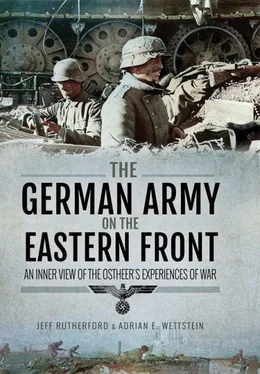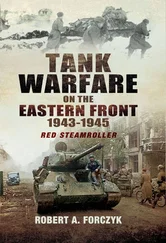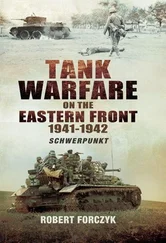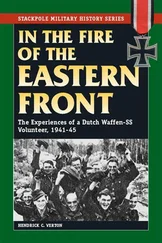The German system of command – which was primarily responsible for the army’s victories from tactical to operational level – was significantly damaged by the campaign on two fronts. First, the tremendous number of casualties suffered not just by officers, but also by NCOs (who were given much more authority in the German army than in other contemporary forces) caused shortages of well-trained and able leaders that persisted throughout the remainder of the war. This necessarily made it more difficult for a system of war based on commanders making a decisive, yet thoughtful and more importantly sound decision on the spot, to function effectively. Second, the theatre of war’s immense size – the fabled Ostraum , which translates as eastern space, but which suggests a hostile land without end – combined with the wide-ranging actions of panzer formations led not just Hitler, but also the Army High Command to tighten up the lines of command on several different occasions; in other words, the Auftragstaktik that had traditionally given the army its flexibility in the field was continuously shorn away by the political and military leadership. This most notably occurred in December 1941 when Hitler issued his famous ‘Halt Order’, effectively denying his field commanders the ability to act as they saw fit, but it was a trend that continued throughout the remainder of the conflict and spread to lower command levels. In both cases, however, enough traditional German leadership practices survived to ensure that the army remained proficient on the battlefield at least through late 1944. One essential point here was the will to adapt to the changing circumstances. German military leadership demonstrated a high level of flexibility in developing new approaches, especially in the tactical, but also in the operational spheres. Less effective were learning processes in intelligence and logistics.
This last area was perhaps the largest problem that the army had to contend with. Neglect played an important role, but the German army simply lacked the means for supplying a far-reaching advance. Confident that the war would indeed be quick, the Germans believed that their logistic weakness would not be too damaging; this assumption proved entirely incorrect, and the Germans struggled throughout the entirety of the campaign – though especially in 1941 – to bring sufficient supplies of ammunition, clothing and food to the front. As the war changed into one of attrition, the transportation problem was exacerbated by a growing need for supply goods of all types, which the German war economy proved increasingly unable to produce. Shortages of most items lowered German combat efficiency – dramatically at times – and the German army consistently found itself operating at a material disadvantage compared to its Red Army opponent. One solution to this problem was to exploit Soviet resources; while captured weaponry became an increasingly important component of German forces in the field – particularly artillery – it was the plundering of Soviet agriculture that proved most detrimental to the German war effort. While living off the land gave the Germans some short-term advantages during the advance in 1941, plundering Soviet peasants only drove them into the arms of a burgeoning resistance movement, thus adding yet another task to an already overburdened and undermanned force.
The German response to any manifestations of popular resistance in the Soviet Union was centred on violence, and while such policy sat squarely in the army’s institutional history, it received an injection of venom from Nazi ideological beliefs. For Hitler and the Nazi leadership, the Soviet Union’s destiny was to serve as the foundation for a German racial empire. As noted in the text, the Germans planned a literal war of annihilation against Soviet state and society, a war which targeted millions of Soviet citizens – from Jews to prisoners of war, from Roma to urbanites – with death. The army’s complicity in this ideological war is well-established, particularly at the higher levels. At the lower levels of the field army, it is clear that various formations, as well as individual men, participated in the war of annihilation; the motivations behind their actions, however, ranged from ideological congruence with the regime, to policies that fit, one way or another, into the concept of military necessity. No matter the reasoning, the army’s anti-partisan, food requisitioning, and scorched earth retreat policies all substantially contributed to the Nazi attempt to decimate the Soviet population and destroy the state.
In an attempt to rectify these issues, the army resorted to ad hoc policies throughout the course of the war. It instituted wide-ranging training courses at the front so that men being trained as officers and NCOs could understand the intensity of the war in the east before being thrown into the front lines. Such attempts to mould Ostkämpfer , or ‘Eastern Fighters’ who were veterans that possessed the necessary hardness, tenacity, and decisiveness to survive in the Ostraum behind the front underscored the seriousness with which the German army took training, and this was ultimately one of the reasons why the army was able to stay in the field despite persistent shortages of men, weapons, and equipment. Another solution to the manpower problem was to enlist Soviet auxiliaries – the Hilfswillige – into the army, generally in rear-area positions to free up German soldiers for combat roles, but occasionally for frontline service. Of course, integrating Soviet citizens into the army’s ranks called for a readjustment of German attitudes towards Soviet civilians as a whole, and lower level army formations attempted to do just that, knowing that only through the mobilization of the occupied territories’ manpower and resources could the Germans achieve victory. Though some units truly strove to reverse course in occupation policy, the radicalization of the army’s behaviour – including that of the individual soldier – during the course of the war and the certainty among Soviet civilians by mid-1943 at the latest that the Red Army would be returning, meant that such programmes had little chance of success.
The experience of the German army during its war with the Soviet Union was one that consistently evolved over time. At the front, the army transitioned from fighting a mobile, offensive war to one based on grinding positional defensive battles. In the rear, the army oscillated between arbitrary violence, conciliatory policies and destruction – during scorched earth retreats and large anti-partisan operations – on a wide scale. While the majority of these policies were designed to maintain the army’s combat efficiency, the size of the Soviet opponent – in terms of manpower, geography, and, more abstractly but no less importantly, will-power – proved too great for the German army to overcome. Despite achieving operational victories unprecedented in modern military history during the second half of 1941, the strategic goal of defeating the Soviet Union proved too great for the army to accomplish and, in the end, its military failure complemented its moral failure.
Bundeswehr : Armed forces of the Federal Republic of Germany, formed in 1956.
Frontgemeinschaft: front society. Has its roots in the romanticisation of front soldiers’ war experience in the First World War. In Nazi rhetoric, the term referred to a classless, egalitarian society of soldiers at the front which was to serve as the basis for German society after the war.
Härte: a key value in the German army. Dual meaning that suggested ‘toughness’ in the face of the enemy and a ‘hardness’ in dealing with the privations and problems of war.
Читать дальше






![John Stieber - Against the Odds - Survival on the Russian Front 1944-1945 [2nd Edition]](/books/405234/john-stieber-against-the-odds-survival-on-the-russian-front-1944-1945-2nd-edition-thumb.webp)





